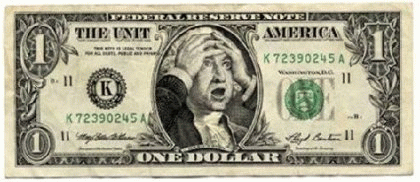This is the first of two articles exploring the likelihood that capitalism is on the verge of collapse and what a post-capitalistic world might look like.
Global Capitalism: a House of Cards
As the global recession and debt crisis worsens, even mainstream analysts are starting to speculate that global capitalism is on the verge of collapse. At the moment, most attention is focused on European "debt contagion." European Union economists are terrified that the Greek government will default on their debt. A Greek default makes it inevitable that Spain and Italy will also default. The mechanism here relates to the totally unregulated, speculative way in which "sovereign debt" (the money countries borrow from private banks to finance government operations) is financed.
Investment banks in France, Germany, London and New York have already jacked up the interest rates they charge Italy and Spain -- high risk investments always command higher interest rates. Higher debt repayments will make Italian and Spanish default inevitable, which will increase interest rates on Japanese, British and US debt -- as all three countries have very high debt levels. Owing to the size of their economies, default in Japan or the US is very likely to crash the global economy.
The Endgame
There are three schools of thought as to how the capitalist endgame is likely to play out. The first predicts a scenario in which the Asian tiger economies (China and India) collapse when the US, Japan and UK do -- given that national economies are hopelessly intertwined as a result of globalization. This school also predicts that any serious global instability will pop the Chinese real estate (debt) bubble. When this happens, the Chinese economy will crash, like the US economy did when the subprime derivatives bubble burst in 2008. The creation of debt bubbles (the bubbles leading to the 1987 market crash and 2001 dot com collapse are examples), involves the creation of vast amounts of credit (i.e. wealth that only exists on paper), which are all wiped out simultaneously when the bubble bursts. This sudden loss of economic wealth inevitably bankrupts large numbers of businesses and causes massive job loss.
The second school believes that only the US,
Europe and Japan
will collapse, while the economies of China,
India and its
Asian and non-Asian trading partners (for example, Australia
and New Zealand)
will continue to prosper. In this scenario the coming debt crisis and crash
will merely accelerate the gradual role reversal of the past two decades -- with
China rising to
the status of economic superpower and the US,
Europe and Japan
becoming third world nations.
The third school supports the scenario I believe Wall Street and the Pentagon have in mind, in which the US and its NATO allies confront China militarily to prevent it from replacing the US as the world superpower. Evidence that the Pentagon has already chosen this tack is seen in the strategic alliances it has formed around Middle East and North African oil resources. Many foreign analysts believe that the US wars in the Middle East and Libya are really proxy wars with China over oil resources. They worry that these proxy wars have the potential to degenerate into a full scale war between the US and China -- which would surely destroy both economies.
China's regional allies in this global struggle are Pakistan, Iran, Saudi Arabia, Angola, Russia, Palestine and (indirectly through Pakistan) a Taliban-controlled Afghanistan. US allies are NATO, India, Israel and Iraq (thanks to permanent US military installations in Iraq).
America's Proxy Energy Wars
Obama's and Hillary Clinton's recent threats against Pakistan for allegedly promoting Taliban terrorism are pure rhetoric. Their purpose is to conceal the strategic importance of Pakistan (and Afghanistan) in US competition with China over oil and national gas resources. It also conceals the reality that the undeclared US war against Pakistan (approximately 2,000 civilians have been killed since the drone attacks started in 2004 -- see http://en.wikipedia.org/wiki/Drone_attacks_in_Pakistan) is really a proxy war against China.
Pakistan is China's strongest ally in protecting the oil supply critical to its booming economy is Pakistan. At present China imports 46% of its oil. In contrast the US imports 60%. (See http://english.peopledaily.com.cn/90001/90778/90860/6891500.html). Twenty percent of Chinese oil imports come from Saudi Arabia and somewhat less from Angola (see http://www.presstv.ir/detail/183746.html.) Ten percent of China's oil imports come from Iran.
Growing Military Tensions in Pakistan
Until recently, all oil originating from Saudi Arabia and Iran had to be transported via the Persian Gulf and the Strait of Hormuz, which is under the control of the US Navy (see http://www.foreignaffairs.com/articles/62604/dennis-blair-and-kenneth-lieberthal/smooth-sailingthe-worlds-shipping-lanes-are-safe). To counterbalance this de facto US control over their oil transhipments, China built a port in Gwadar (in Balochistan province) Pakistan to facilitate overland oil transport -- via an extensive Chinese-built super highway and eventually the IPIC (the Iran- Pakistan- India-China) pipeline.
(Note: You can view every article as one long page if you sign up as an Advocate Member, or higher).






